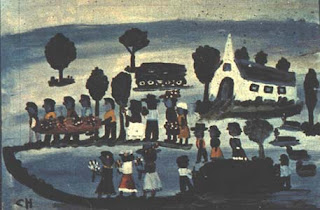 |
| Clementine Hunter - The Funeral |
I’m at a bit
of a disadvantage today as I prepare for preaching this Sunday at Seneca
Presbyterian Church. The group of faithful seekers who normally engage the text
with me were not in session this week. I miss their input because the subject
of this final sermon in the series on Christian practices is powerful,
personal, and profoundly theological. How do we as Christians mark the moment
of death?
My seminary years were long ago – in
the mid seventies. It was a time when the progressive church was challenging traditional
funeral practices. We were taught to be wary of funeral directors who wanted to
sell grieving families expensive vaults that would protect the human remains of
their loved one forever. It would come, we were warned, in a package deal that
included limousine service and the use of the funeral home’s chapel where families
could sit behind a screen during the service, their tears privately protected
from public view.
In the years since then I’ve watched
many grieving families and seen many different ways for honoring the dead. We
have moved away from a static tradition toward many personalized options. In
the three years I have served as pastor at Seneca Presbyterian, I have been
privileged to walk with roughly two dozen families at the time of death. A few
had no service at all. Some were just graveside services. Most were cremations.
The ashes of many of those saints are buried in our memorial garden, a ministry
that means much to me.
Only a few were conducted the “old fashioned”
way – with a casket present in the sanctuary followed by a service at the
grave. One of those exceptions was profoundly meaningful. We accompanied a
saint of the church and a career military officer to a burial at a veterans’ cemetery
not far from a base where he and his family served our country.
I’m grateful for the options and the choices
they give families. In all circumstances, we seek to do the three things an
early mentor in ministry once taught me about funerals: we honor a life, we comfort
each other in our grief, and we celebrate a faith that believes death is not
the final word for a God who forever brings life from death. But in the midst of
our options, I hope the traditional one is still viable.
Tom Long, a respected theologian and
preacher, ignited a firestorm several years ago in his book Accompany Them with Singing: the Christian
Funeral (Westminster/John Knox Press, 2009). As he wrote the book, he came
to a position that surprised even himself: that the Christian funeral is a gathering
of believers who accompany the body (the physical body) of one of God’s saints
on a journey from death to the portal of life everlasting. His work is profound,
and his reasoning is far more complex than can be explained here. But it does
offer food for thought.
We live in a world filled with death
and sorrow. Too many think too little of taking life, particularly the lives of
those they label as stranger or enemy or threat. Yet we worship a God who
honors bodies – even dying ones, and even dead ones. What can that God teach us
about the way we mark our mortality at the time of death?


